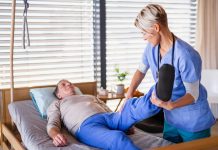
Recovering from a stroke is a challenging journey that touches not only physical health but also mental well-being.
Many survivors find themselves battling depression and anxiety, making their recovery even tougher.
The good news comes from recent research that offers a glimmer of hope for those navigating this difficult path.
This research suggests that most stroke survivors can safely use certain antidepressants to help them recover, without the fear of dangerous side effects like unusual bleeding.
Strokes caused by blood clots, known as ischemic strokes, are common.
The study focused on these patients and discovered that those who were prescribed antidepressants known as SSRIs (like sertraline and fluoxetine) or SNRIs (like venlafaxine) didn’t face any higher risk of bleeding, even when they were also on medication to prevent further clots.
This is reassuring, especially since there’s been a worry that these antidepressants could increase the risk of bleeding in the brain.
However, there’s a note of caution for patients undergoing a specific blood-thinning treatment, dual antiplatelet therapy (DAPT).
The research found that these patients had a higher chance of experiencing a bleeding stroke when they also took antidepressants. Yet, since DAPT is usually a short-term treatment, doctors might not need to hold off on antidepressants for long.
Depression and anxiety are not uncommon after a stroke, affecting about one-third of survivors.
These conditions can severely impact one’s quality of life and hinder recovery by making daily activities more difficult.
Despite the known risks of depression and anxiety following a stroke, many healthcare providers hesitate to prescribe SSRIs and SNRIs due to concerns over bleeding risks.
This study aims to change that perspective by showing that, in many cases, these medications can be safely used, potentially improving the recovery process for many survivors.
The study, led by Dr. Kent P. Simmonds from the University of Texas Southwestern Medical Center, looked at medical records from over 70 healthcare organizations spanning 20 years.
It included data from 666,150 stroke survivors, with a significant number having been prescribed SSRIs or SNRIs.
The researchers found that serious bleeding issues, such as bleeding in the brain or digestive tract, were not more likely in those who took these antidepressants, even among those on anticoagulation drugs like warfarin.
However, the study did find an increased risk of bleeding in patients who combined SSRIs and SNRIs with DAPT, indicating the need for doctors to carefully consider the risks and benefits in these cases.
Dr. Simmonds emphasizes the importance of addressing mental health conditions early in the stroke recovery process.
He suggests that treating depression or anxiety soon after a stroke is crucial since the early months are when the most significant recovery typically happens.
Though the study didn’t consider the dosage, duration, or the exact number of antidepressants taken by participants, it opens the door for further research, especially concerning survivors of bleeding strokes.
This research is a promising step forward, offering hope that treating post-stroke depression and anxiety might become a standard part of recovery, making the journey a little easier for survivors.
With continued exploration and understanding, the goal is to provide a comprehensive recovery plan that includes both physical and mental health support for stroke survivors.
If you care about stroke, please read studies about how to eat to prevent stroke, and diets high in flavonoids could help reduce stroke risk.
For more information about health, please see recent studies about how Mediterranean diet could protect your brain health, and wild blueberries can benefit your heart and brain.
The research findings can be found at the American Stroke Association’s International Stroke Conference.
Copyright © 2024 Knowridge Science Report. All rights reserved.



